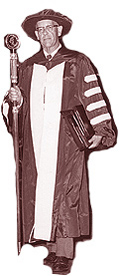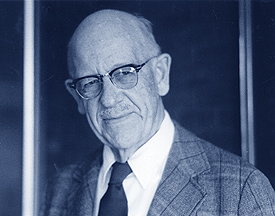This is an archived article. For the latest news, go to the Advance Homepage.
For more archives, go to the Advance Archive/Search Page. 
|
|
Max Thatcher, professor emeritus of political science, died August 29 after a lengthy illness. He was in his 80s.
He spent 38 years with the department before retiring in 1984. Thatcher moved to Storrs during the massive expansion of higher education that followed World War II. Former soldiers were flocking to the University and many buildings, including the North Campus residence halls, were being constructed. He was one of the founding members of the Department of Government and International Relations, the forerunner of today's political science department. Thatcher attended the University of California at Los Angeles and at Berkeley, and earned his doctorate from Northwestern University. His fields of interest were federalism and political theory. At UConn, he taught political theory and comparative government and, later, courses in Canadian politics. Thatcher is said to have once estimated that he had taught 30,000 students. "He taught some of the largest classes ever given at the University - at one time, there was a class with close to 400 students," says Fred Kort, emeritus professor of political science. "That was before current technological aids were available, yet he never had any need to use a microphone." He gave generously of his time, both in and outside the classroom. "He was always there for his students," Kort says. Thatcher, known for his abundant store of anecdotes, is remembered warmly by former students and colleagues alike. "Max was a gentleman, a scholar and an important part of our departmental history," says John Rourke, professor and head of the political science department.
"Max always carried two briefcases, one with activities, and one with political science work," says Andy Baylock, head baseball coach and a close friend of Thatcher. For 25 years until his retirement, and for several years after that, Thatcher also was recording secretary for the University Senate. "He was very meticulous about making sure our records were accurate and complete," says Peter Halvorson, professor of geography and chair of the Senate Executive Committee. "It was commonplace that after a Senate meeting, some time that night or the next, Max would be on the phone trying to double-check and make sure he had things right," Halvorson says. Thatcher became a legend, however, as University Marshal and chair of the Commencement Committee for more than 20 years. "When Max was around, you knew," says Halvorson, who took over from Thatcher as University Marshal in the 1980s. "He had a presence." Over the years, Thatcher helped shape the University's commencement ceremonies. "Much of the tradition and ritual now in place bears the stamp of Max's work," says Halvorson. "When Max first came here, the University was graduating a few hundred students a year. By the mid-1960s, we were graduating thousands. There had to be many changes to accommodate the changes in scale, and Max worked with a series of presidents in that capacity - from (Homer) Babbidge to (John) DiBiaggio." With history professor Fred Cazel, he also fashioned the ceremony of awarding honorary doctorates, a practice introduced relatively recently. Thatcher's many interests extended to the fine arts and sports. He particularly enjoyed the symphony and wrote music reviews of performances at Jorgensen Auditorium. His interest in athletics included tennis, baseball, and track and field, says Coach Baylock, who got to know him when Thatcher was head timer for indoor track meets. He says Thatcher was an avid sports fan, attended practices and games, and even traveled with Baylock to recruit players. After Thatcher's retirement, he and his wife Mary, a librarian at the University for 30 years, continued to live in Storrs. "Their whole life was UConn," says Baylock. Thatcher is survived by his wife, and a daughter who lives in California. |
 An outstanding teacher and deeply involved member of the University
community, he joined the UConn faculty in 1946, beginning at
the temporary Fort Trumbull regional campus near Norwich before
coming to Storrs.
An outstanding teacher and deeply involved member of the University
community, he joined the UConn faculty in 1946, beginning at
the temporary Fort Trumbull regional campus near Norwich before
coming to Storrs.  Thatcher also had many interests beyond academics.
Thatcher also had many interests beyond academics. 